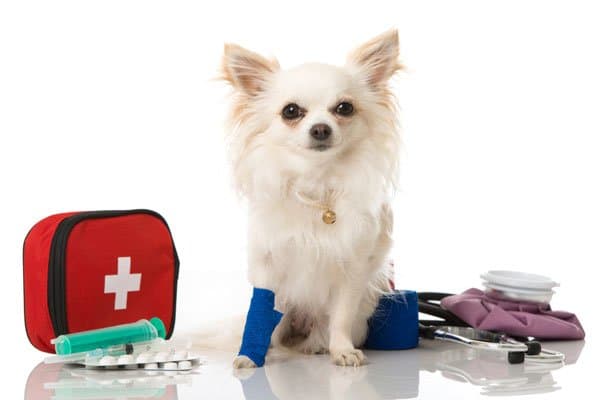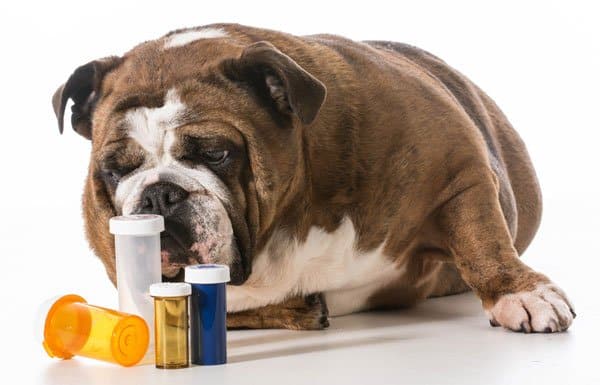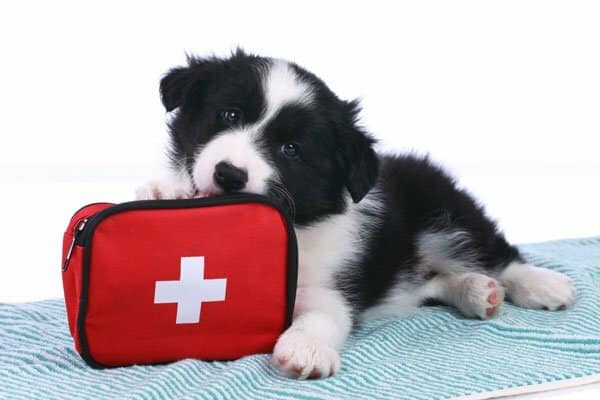Forty percent of people would save their pet’s life over that of a stranger. But, are you actually prepared to treat your pet if an emergency should occur? Just as you should have a first aid kit for you and your family, it’s vital to have a dog first aid kit ready to go for those times your canine friends need medical assistance.
While it’s always best to seek professional veterinary treatment, if you’re away on vacation or facing a natural disaster, that might not be possible. Which is why you need to be ready to care for your dog with all the essential dog medical supplies you could possibly need.
Read on to find out everything that first aid kits for dogs should include.
Dog First Aid Kit Essentials
While you may need extra items depending on your dog’s breed and medical history, here are the essential supplies that should be in every dog emergency kit:
Paperwork and Phone Numbers
In an emergency, you’ll want all of your dog’s information to hand. Keep a printed copy of all their medical records, prescriptions, and vaccination records. If your dog needs urgent medical attention while you’re away from home, this will help an emergency vet provide better care.
It’s also wise to keep a list of emergency phone numbers in your pet first aid kit. This way, if your phone is lost or out of battery, you’ll still have easy access to these numbers, as will anyone who dog sits for you.
Dog First Aid Kit Manual
A book or manual on dog first aid, like the one by the Red Cross, is another essential resource for your pet emergency kit. No matter how much you think you know, it’s always a good idea to have professional advice to hand if you can’t get in touch with an emergency vet or helpline.

Dog First Aid Kit Tools
First aid kits for dogs should include these must-have tools:
- Disposable Gloves: Gloves keep your hands clean and also prevent the possibility of you infecting your dog’s wound with bacteria from your hands.
- Scissors: These are essential for cutting tape, gauze and other first-aid materials. Scissors are also useful for cutting an old shirt into strips to make a secure bandage for larger wounds.
- Tweezers: Use tweezers to remove small items such as thorns and splinters from your dog’s paws.
- Tick Remover: While you can remove dog ticks with tweezers, a specialized tick remover is better for removing embedded ticks.
- Digital Thermometer: Use this to check your dog’s temperature in cases of suspected fever, low body temperature, or heat stroke.
- Eyedropper or Syringe: This is ideal for giving oral medications or to flush wounds.
- Instant Cold Pack: Wrap this in a towel and use it to decrease swelling and inflammation after a sprain or strain, bruising, or a bee or wasp sting.
Make sure to keep these tools clean to avoid the possibility of spreading infection while trying to treat your dog.
Bandages and Tape
Bandages, gauze, tape, and pads in various sizes are vital for controlling bleeding, cleaning wounds, and wrapping up cuts, burns, and other injuries. The specific items your pet first aid kit should include are:
- Gauze
- Non-stick bandage pads
- Adhesive tape
- Cotton balls or swabs
Remember to always use dog medical supplies and not bandages and pads made for humans.
Medications for Dog First Aid Kit
If your dog takes any prescription medications, include a backup supply in your pet emergency kit. This will come in handy if you’re traveling or can’t access your regular supply.
The same goes for any vet-approved OTC medicines your dog sometimes takes. These might include flea and tick medications, sedatives for traveling, allergy tablets, and antacids for stomach issues.

Hydrogen Peroxide
Use fresh 3 percent hydrogen peroxide to induce vomiting if your dog eats something toxic. Check with your vet to ensure you know how to administer this and that you’re familiar with the correct dosage.
Saline Solution
Use this for cleaning or flushing a wound. Saline solution is also ideal for flushing your dog’s eyes in the event of grass seed, pollen, or another foreign object getting stuck in there.
Artificial Tears
Lubricating eye drops will restore moisture to your dog’s eyes and prevent irritation or discomfort after flushing their eyes with saline solution.
Antibiotic Ointment
Even minor cuts, scrapes and scratches can lead to health problems if they become infected. An antibiotic spray or ointment will help relieve pain and prevent infection. Apply it to these kinds of wounds before placing bandages over them to create a barrier from bacteria and germs.
Blood-Clotting Powder
Styptic powder will stop bleeding from injuries such as wounds, bites, and torn toenails, and help you avoid the possibility of a blood-soaked car when you go to seek medical attention. And more importantly, this ensures that your dog doesn’t suffer dangerous blood loss in the event of more serious cut.
Silicone Collapsible Water Bowl
Collapsible bowls are useful to have with you at all times but could prove vital for keeping your dog hydrated in an emergency situation.
It’s also a good idea to keep a stash of food and dog treats in your dog emergency kit. Treats will make it easier for you to distract your dog while you see to an injury, or can serve as a reward for good behavior.
Blanket
Wrapping up an injured or panicking dog in a soft blanket can help to calm them down. You should then be able to treat them without getting scratched or bitten.
A blanket also serves as a soft surface to rest your dog on while you take a closer look if the ground is too hard, hot, or covered in rocks.

How to Make a Dog First Aid Kit
With these essential items in your dog first aid kit, you’ll be prepared for almost any emergency. But remember, it’s also vital to check your supplies every couple of months to make sure nothing has expired or needs replacing.
For more information on caring for your dog, feel free to contact us with any questions or queries.



